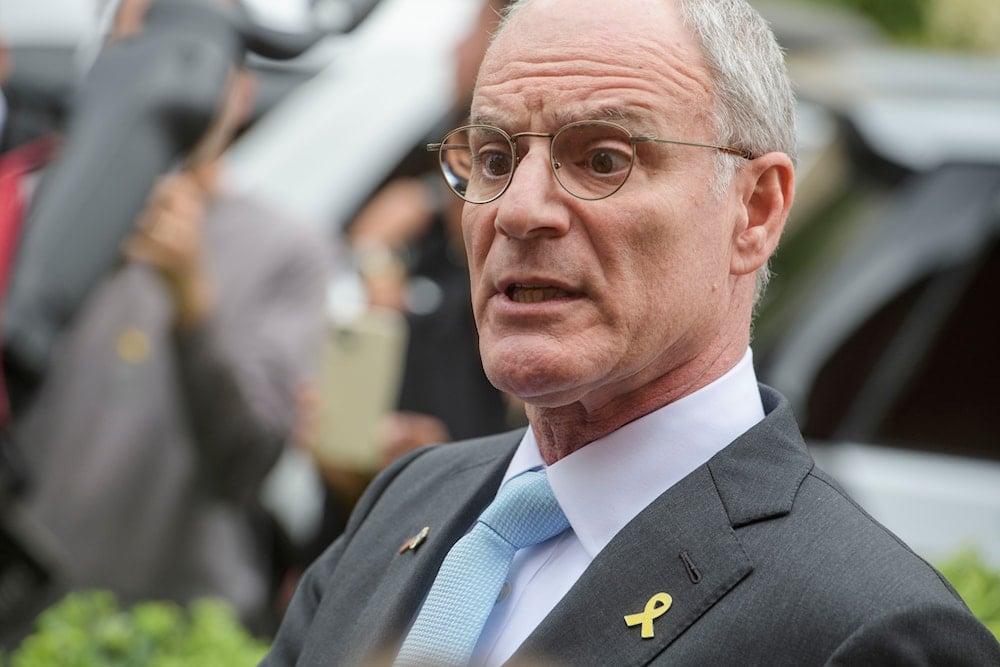'Israel' summons US envoy over jab at Netanyahu's rivals
Israeli ambassador to the US Yechiel Leiter has sparked controversy after criticizing "Israel's" legal system in a PragerU interview, prompting official backlash.
-

Israeli Ambassador to the US Yechiel Leiter talks with reporters Thursday, May 22, Washington, DC, United States. (AP)
Israeli ambassador to the United States Yechiel Leiter was summoned by the Director General of the Foreign Affairs Ministry, Attorney Eden Bar-Tal, for a hearing about comments on the Israeli legal system he made during an interview for the conservative media platform PragerU on Thursday.
The summoning was made following instructions from the Director of the Senior Disciplinary Division at the Civil Service Commission, as during his interview for PragerU last Thursday, Leiter made harsh criticisms targeting "Israel's" legal system.
He claimed that the legal system "unfairly" targets Prime Minister Netanyahu despite his "innocence", while also condemning the opposition as "evil" and accusing left-wing voters of spreading fabricated "blood libel" allegations.
Leiter dismissed allegations that Netanyahu is extending the war to avoid legal troubles, mocking the charges as trivial and baseless and claiming that they were designed to pressure him into resigning but ultimately failed as the case against him unraveled.
During the interview, Leiter also addressed the "Abraham Accords", suggesting that there is no obstacle to advancing normalization with Syria and Lebanon.
“We have dramatically changed the paradigm there. I’m very upbeat about the potential for an Abraham Accord with Syria and Lebanon, and that may actually precede Saudi Arabia," Leiter stated.
This comes as internal strife grows in "Israel", as the Israeli government led by Netanyahu faces sharp criticism for expanding the war on Gaza instead of prioritizing the safe return of the remaining captives.
Netanyahu faces internal criticism
In a universe parallel to Leiter's, former Prime Minister Ehud Barak stated in a Financial Times op-ed that "Israel's" military campaign in Gaza faces a decisive moment nearly 20 months after October 7, condemning the prolonged conflict as a "strategic disaster" in blunt terms, calling on "Israel's" government to demonstrate decisive political vision and ethical accountability.
Barak presents two options: either negotiate an agreement to free all remaining captives and conclude the conflict or persist with what he describes as the unrealistic goal of achieving "total victory" against Hamas through military means, while cautioning that further hostilities in Gaza would prove pointless, jeopardize the captives still held there, and worsen the already dire humanitarian crisis in the territory.
Barak insists a hostage deal aligns with "Israel's national interest," enabling captives' return, stopping destruction, easing Gaza's crisis, and advancing "regional diplomacy," while foreseeing potential benefits like "normalization with Saudi Arabia" and involvement in the "India-Middle East-Europe Economic Corridor," framing diplomacy as the pragmatic alternative to endless war.
Israelis widely disapprove of Netanyahu
This comes amid growing convictions in "Israel" that Netanyahu is prolonging the war to maintain power as evident in a Channel 12 poll published on May 24 which revealed that 55% of Israelis believed Netanyahu's primary focus was maintaining power, while 36% thought his main goal was securing the captives' return, and 9% were uncertain. When the question substituted the hostage objective with "winning the war," results showed minimal change, further cementing the view of political self-preservation.
When asked about the reasons behind the stalled negotiations for a new hostage agreement, 53% of respondents blamed political considerations for the lack of progress, while just 38% accepted that there might be valid justifications for the delay, and 9% said they were unsure.
A previous poll by Channel 12 published on March 23rd revealed that 63% of Israelis were worried about the future of democracy in "Israel", following the cabinet's ouster of former Shin Bet Chief Ronen Bar.
Another Channel 12 poll published on March 29th revealed that 70% of Israelis do not trust Benjamin Netanyahu's government, with 66% of Israeli settlers believing that it prioritizes religious and coalition-affiliated groups over the general public.

 4 Min Read
4 Min Read








